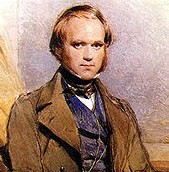As my husband had surgery today, and I’ve been helping him prepare (yesterday), and then spent today at the hospital, today’s post is an extended riff on one from last year, also on Darwin’s birthday.
 I love science. And of course Darwin — like Da Vinci, like Einstein, like Copernicus — dominates it. Today is his birthday, and I promise this post has to do w/ beginner’s heart (at least eventually!). One semester — and one only — I tried to teach Darwin in a lit class. We do a lot of nonfiction in literature (Benjamin Franklin, Mary Wollstonecraft, Scott Momaday, just to name a few), looking at figures w/ long-term literary impact. Several of my students (and this was an honours class) flat refused to read Darwin. Nope, they told me. He’s … well, Darwin. And against their religion(s).
I love science. And of course Darwin — like Da Vinci, like Einstein, like Copernicus — dominates it. Today is his birthday, and I promise this post has to do w/ beginner’s heart (at least eventually!). One semester — and one only — I tried to teach Darwin in a lit class. We do a lot of nonfiction in literature (Benjamin Franklin, Mary Wollstonecraft, Scott Momaday, just to name a few), looking at figures w/ long-term literary impact. Several of my students (and this was an honours class) flat refused to read Darwin. Nope, they told me. He’s … well, Darwin. And against their religion(s).
Just to read him? I asked, incredulous. You can’t even READ him, to see what he said in his own words? And to a student, they shook their heads. I promise I’m not exaggerating, nor am I over-stating their adamant refusals. No negotiating — Darwin may as well be the anti-Christ.
Because this had never happened to me before, and because I don’t believe in putting students on the spot, I allowed them to read something else. But I’ve never forgotten that class. Nor the quiet, back-door responses of other students to this small cadre of their very vocal and conservatively religious colleagues. One told me she felt totally disdained by the students in the class, because she was an atheist. Another told me that he felt his religion — Judaism — was both maligned and dismissed by the conservative Christian students.
I offer no facile comments or final conclusions about this class. I don’t understand it now much better than I didn’t then, if that makes sense. It’s always been incomprehensible to me that any literature is ‘forbidden.’ I did ask my students why they had been forbidden to read Darwin. They hadn’t been expressly ‘forbidden,’ they assured me. But to a person, they said that Darwin was evil, and they were ‘discouraged from’ reading his work. After all, he denied the divine plan.
But here’s what I wonder: how can mere human beings even discern the divine plan — always given that there is one…? If something there is that created the spark that became today — the dark flavour of a hot mocha with an extra shot, the break in winter cold, the exceptional kindness of a nurse at the outpatient clinic where I spent the day with my husband — how can I, addled mortal that I am, comprehend that? And why should faith feel threatened by knowledge? Note: I didn’t ask the students to accept Darwin; just read him.
My students were not interested in discussing their decision. I did ask if they followed the Old Testament, and the Laws of Leviticus. This is what hurt my Jewish student — the Darwin-deniers were appalled at the idea. But it’s the Old Testament — Genesis et al — that drives the Young Earth creation myth. And to be a Young Earther means you also deny the following scientific fields, as I’ve touched on elsewhere: physics, chemistry, geology, astronomy, cosmology, paleontology, molecular biology, genomics, linguistics, anthropology, archaelogy, climatology, and dendochronology. In 2011, 30% of Americans said they took the Bible literally — no interpretation. In other words? They believe in the Young Earth philosophy. No wonder we don’t have many scientists!
 So, Darwin, what do you have to say about this? Baptised Anglican, raised in the Unitarian church, you studied to be Christian clergy. You refused the label ‘atheist,’ preferring to be known as an agnostic. You even included a quote from Charles Kingsley in Origin, in which Kingsley argued that it was “just as noble a conception of Deity, to believe that He created primal forms capable of self development… as to believe that He required a fresh act of intervention to supply the lacunas which He Himself had made.”
So, Darwin, what do you have to say about this? Baptised Anglican, raised in the Unitarian church, you studied to be Christian clergy. You refused the label ‘atheist,’ preferring to be known as an agnostic. You even included a quote from Charles Kingsley in Origin, in which Kingsley argued that it was “just as noble a conception of Deity, to believe that He created primal forms capable of self development… as to believe that He required a fresh act of intervention to supply the lacunas which He Himself had made.”
Now, here we are, almost 200 years later. And like my students, many Americans refuse to even read Darwin. And I’m no closer to understanding why. Still, I suspect Darwin wouldn’t care a jot. Evidence, he would say, trumps faith. But it needn’t cancel it out. Darwin might be not a test of faith, but of scientific imagination.

